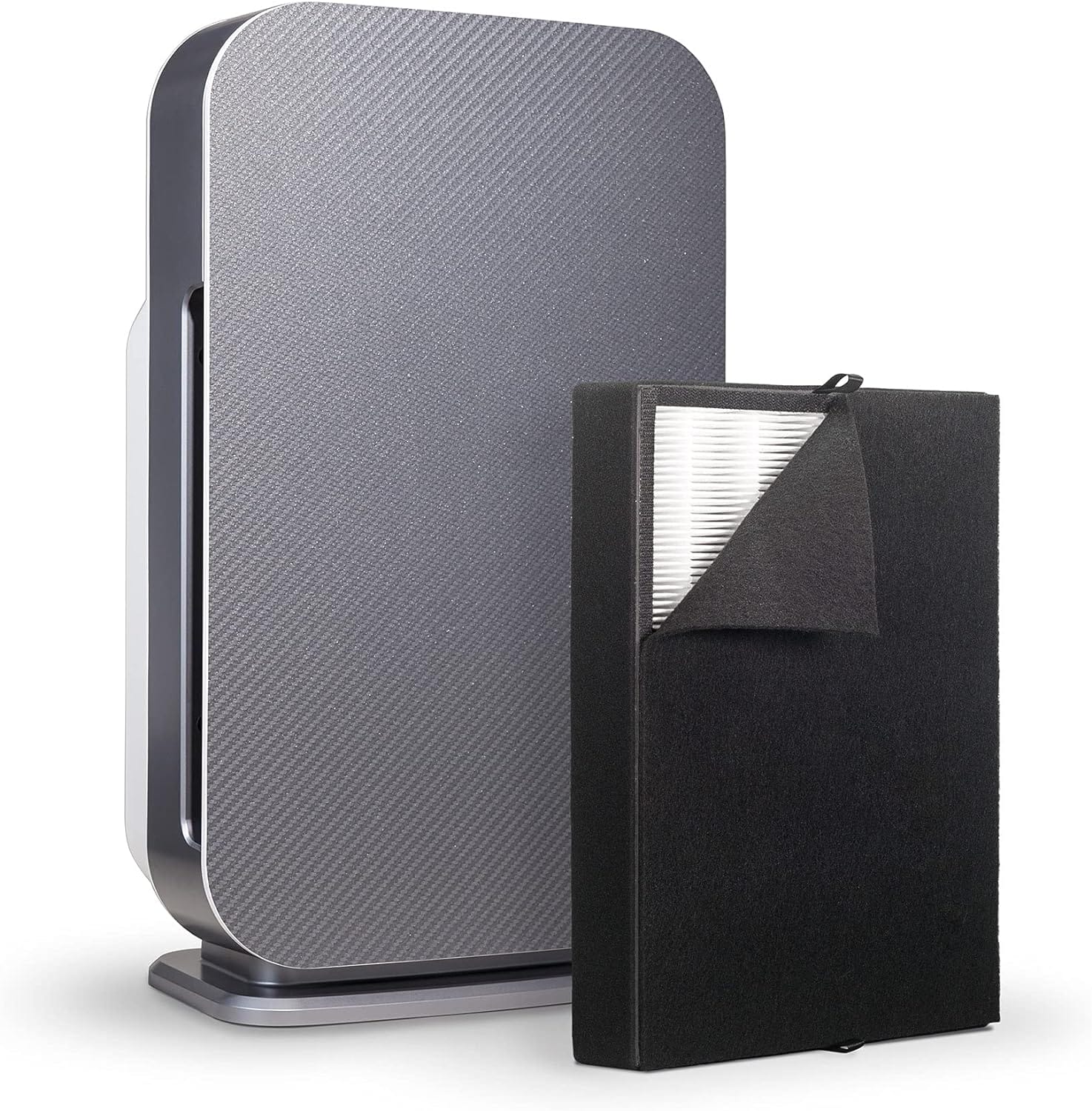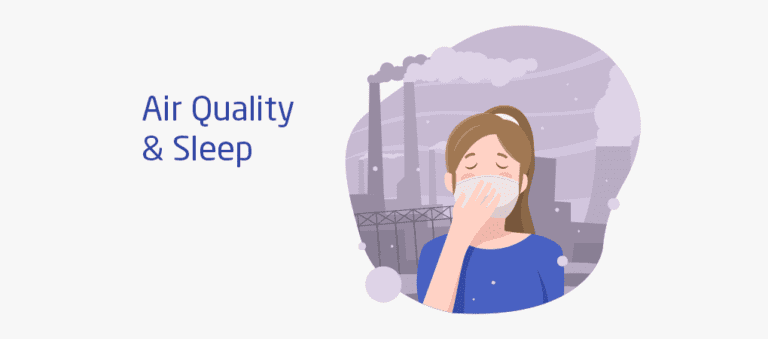Air Quality and Sleep: A Look at the Connection
| Air Quality Factor | Impact on Sleep | Possible Reasons | Tips for Better Sleep |
|---|---|---|---|
| Outdoor Air Pollution (PM2.5, Ozone) | – Reduced sleep duration and efficiency<br>- Increased sleep disturbances and apnea<br>- Difficulty falling asleep | – Inflammation in the airways<br>- Disruption of the nervous system | – Close windows at night, especially in polluted areas<br>- Use an air purifier with HEPA filter<br>- Monitor local air quality reports and stay informed |
| Indoor Air Pollution (Dust mites, Mold, Chemicals) | – Similar sleep disturbances as outdoor pollution<br>- Allergic reactions leading to congestion and discomfort | – Triggers respiratory issues<br>- Interferes with the body’s natural sleep-wake cycle | – Regularly clean and vacuum bedroom<br>- Control humidity levels (30-50%) to prevent mold growth<br>- Use allergen-proof bedding and mattress covers |
| Carbon Dioxide (CO2) | – Decreased sleep quality and REM sleep<br>- Headaches and cognitive impairment in the morning | – Reduces oxygen availability in the blood<br>- Disrupts the body’s natural sleep-wake cycle | – Ensure proper ventilation in the bedroom<br>- Open windows before bed if air quality permits<br>- Use an air purifier with CO2 sensor |
| Temperature | – Difficulty falling asleep and staying asleep in hot or cold environments | – Disrupts the body’s natural thermoregulation needed for sleep | – Maintain a cool bedroom temperature (60-67°F) at night<br>- Use breathable bedding and avoid heavy pajamas<br>- Take a warm bath before bed (not too close to bedtime) |
| Noise | – Increased sleep disturbances and awakenings<br>- Difficulty falling asleep and staying asleep | – Interrupts sleep cycles and increases stress levels | – Use earplugs or noise-cancelling headphones<br>- Create a quiet sleep environment<br>- Address any persistent noise sources (e.g., traffic, neighbors) |

Research published by the Annals American Thoracic Society states that the ill effects of air pollution may cause many people to lose sleep.
Researchers have found that people living in regions with high air pollution are likely to face sleep problems compared to those living in areas with less air pollution.
Low quality and lack of sleep have adverse effects on humans. It increases the chances of accidents and also makes them moody. If this becomes a habit, then it can be harmful to your health. People not having adequate sleep are more likely to suffer from cancer and cardiovascular diseases.
How Air Pollution Affects your Airways
Poor air quality could affect your upper airways and increase sleep apnea chances. Dr. Ryan Donald, sleep medicine expert at The Ohio State University, said that they need to research more to conclude if poor air quality and sleep are interconnected.
There are many reasons for sleep apnea. Air pollution causes congestion in the upper airway, but mold, dust, and pollen can also cause allergies and increase the chances of sleep apnea.
A study has found an association between air pollution and sleep but not a cause-effect relationship. Dr. Martha E. Billings, professor of Medicine at the University of Washington, stated that there is no direct relationship between air pollution and sleep. Still, yes, pollution causes people not to have a sound sleep. It makes them toss and turn while they are asleep.
Billings said that more studies are required to understand the direct link between air quality and sleep.
Air Pollution and Mood
Adverse air pollution also affects your mood. A research published a few months back on people’s happiness pointed out that people living in more polluted areas are less happy.
Researcher Siqi Zheng of MIT China Future City Lab stated that pollution also has an emotional effect. Pollution makes people unhappy and causes them to make irrational decisions. Researchers also noticed that people who do not like to live in air-polluted areas move to clean cities and are likely to experience mood swings when they live in more polluted areas.
Also, people living in cities with adverse air pollution are aware of and worried about their adverse health effects.
Air Pollution and Health Problems
Air pollution has a direct link to increased chances of respiratory problems like asthma and lung cancer. Studies have shown a relationship between air pollution and many health problems.
A study published in 2017 by the researchers of the University of Birmingham, United Kingdom, stated that every additional 10 micrograms of PM 2.5/cubic meter of air increased the chances of cancer by 22% in seniors.
Another research stated that there are increased chances of premature birth if the pregnant woman is breathing highly polluted air. Other research stated that air pollution particles in the human brain could lead to dementia.
Indoor Air Quality and Sleep
Indoor air pollution could be more harmful than outdoor air. The outdoor air is around 4 to 5 times less polluted than indoors.
People are becoming more careful about what they eat and drink, but airborne chemicals can easily enter their bodies. One of the best ways to improve indoor air quality is to have more organic options at home.
One of the common airborne chemicals in our houses are toxic gases like Volatile Organic Compounds and PBDEs. It is next to impossible to find a house to stay in the United States without any airborne chemicals.
VOCs are found in homes in paints, hobby supplies, dry-cleaned clothes, aerosol spray, air fresheners, etc.
Your bedroom is the place where you can avoid toxic chemicals. Converting your bedroom into a healthy retreat can be a positive impact on your health and your children. Clean air helps you have a good night’s sleep and is significant for overall health.
Quality Air Purifier
Investing in a quality air purifier is the best way to improve air quality. Although it is almost impossible to limit toxins and pollution, an air purifier can help you breathe cleaner air.
You should look for an air purifier that has been tried and tested by users. Go for the one that removes more than 99% of airborne contaminants larger than 0.3 microns.
Also, choose the purifier that eliminates more than 2500 toxic gases and odors surrounding you, like ammonia, benzene, cooking odor, dry cleaning odor, etc.
I recently reviewed the Molekule Air Purifier It will eliminate VOCs and goes beyond what a standard HEPA filter can do. I highly recommend it.
Frequently Asked Questions
Can Air Quality Affect Sleep?
Air pollution could affect the quality of sleep. The researchers have focused on two aspects: sleep quality and sleep efficiency. Sleep quality is measured as the total number of hours you sleep and the times you wake up after falling asleep.
Can Air Pollution Make You Feel Tired?
The pollutants in the air cause an increase in fatigue. If you feel tired often, you should take some time off from working in poor air quality areas. One of the common symptoms of poor air quality is headache.
How Does Poor Air Quality Affect Health?
Long term exposure to poor air quality can lead to many health issues like:
- Development of chronic respiratory diseases
- Asthma
- A decrease in lung function
- Respiratory issues like irritation of airways, difficulty in breathing and coughing.
Air purifiers can improve sleep quality in several ways, depending on the specific pollutants and irritants they target:
1. Removing allergens and irritants:
- HEPA filters: These capture dust mites, pet dander, pollen, mold spores, and other allergens that trigger nasal congestion, coughing, and itchy eyes. Reducing these allergens can significantly improve sleep quality for allergy sufferers.
- Carbon filters: These absorb volatile organic compounds (VOCs) and household odors that can irritate airways and disrupt sleep. This can be helpful for people living in polluted areas or with sensitivities to chemical smells.
2. Reducing airborne particles:
- HEPA filters: These also capture fine dust particles (PM2.5) that can enter lungs and worsen respiratory issues, leading to disrupted sleep. This can be particularly beneficial for people with asthma or other chronic respiratory conditions.
3. Neutralizing odors:
- Carbon filters: As mentioned above, these can remove unpleasant odors from pets, cooking, or other sources, creating a more relaxing and sleep-conducive environment.
4. White noise generation:
- Some air purifiers produce white noise, which can mask other disruptive sounds and help people fall asleep and stay asleep. However, this may not be suitable for everyone.
5. Improved mood and well-being:
- Cleaner air can indirectly improve sleep quality by reducing stress and anxiety associated with breathing difficulties, allergies, or poor air quality concerns.
It’s important to note that:
- Air purifiers may not be a magic bullet for sleep problems. While they can address some air quality issues that impact sleep, other factors like stress, caffeine intake, and sleep hygiene also play a crucial role.
- Choosing the right purifier matters. Ensure you get a purifier with appropriate filters for your specific needs. Consider factors like room size, noise level, and filter replacement costs.
- Proper maintenance is key. Replace filters regularly according to the manufacturer’s instructions to ensure optimal performance.
Remember, consulting a doctor is essential if you experience chronic sleep problems, as underlying medical conditions might be at play.
Sleep quality improves with air quality through several interconnected mechanisms:
Reduced respiratory issues: Poor air quality exposes you to pollutants, allergens, and irritants that can trigger congestion, coughing, and difficulty breathing. These disruptions during sleep can significantly impact its quality and leave you feeling tired and unrested. Cleaner air means less irritation and easier breathing, facilitating deeper, more restful sleep.
Improved oxygen intake: When air quality is poor, there may be less oxygen available in the environment. This can lead to hypoxemia, a condition where the blood oxygen levels are too low. This further disrupts sleep cycles as your body struggles to maintain proper oxygenation, leading to frequent awakenings and lighter sleep. Breathing clean air ensures optimal oxygen intake throughout the night, promoting deeper and more restorative sleep.
Enhanced nervous system function: Poor air quality can trigger inflammatory responses in the body, impacting the nervous system and disrupting its natural sleep-wake cycle. Pollutants and allergens can also directly affect neurotransmitters involved in sleep regulation, making it harder to fall asleep and stay asleep. Cleaner air minimizes these disruptions, allowing the nervous system to function optimally and promote healthy sleep patterns.
Reduced stress and anxiety: Poor air quality can contribute to a sense of unease and discomfort, even subconsciously. This can trigger stress and anxiety, making it harder to relax and fall asleep. Addressing air quality concerns can create a more calming and restorative sleeping environment, reducing stress and promoting relaxation, both crucial for good sleep.
Overall healthier environment: Good air quality goes hand-in-hand with other aspects of a healthy sleep environment. Cleaner air often means reduced dust mites, mold, and other allergens, leading to fewer allergy-related sleep disruptions. Also, maintaining good air quality often involves proper ventilation and temperature control, contributing to a comfortable and sleep-conducive environment.
It’s important to remember that individual sensitivity to air quality can vary, and addressing other sleep hygiene factors alongside improving air quality is crucial for optimal sleep. However, focusing on clean air significantly creates a foundation for good sleep by minimizing disruptions and fostering a calm, healthy environment for your body and mind to rest and recharge.
Emerging Research on Air Quality and Sleep: Exciting Frontiers
The realm of air quality and sleep holds many exciting areas of ongoing research, delving deeper into the intricate connections and exploring novel solutions. Here are some key points to highlight:
1. Personalized approaches:
- Genetic variations: Research is investigating how individual genetic makeup might influence susceptibility to sleep disruptions from air pollution. This could pave the way for personalized recommendations on managing air quality for optimal sleep.
- Microbiome analysis: Studies are exploring the gut microbiome’s potential role in mediating the impact of air pollution on sleep. Understanding these connections could lead to targeted interventions like dietary adjustments or specific probiotics.
2. Beyond traditional pollutants:
- Nanoparticles: Growing research focuses on the influence of ultrafine particles smaller than PM2.5, which can easily penetrate deep into the lungs and potentially affect sleep quality.
- Chemical composition of air pollution: Studies are analyzing the specific components of air pollution (e.g., specific types of VOCs) and their unique effects on sleep, leading to more targeted mitigation strategies.
3. Technological advancements:
- Real-time air quality monitoring: Wearable devices and smart home sensors continuously track air quality, allowing for personalized feedback and adjustments to air purifiers or ventilation systems.
- AI-powered sleep monitoring: Advanced sleep trackers combined with air quality data could identify specific patterns and correlations, leading to personalized sleep optimization strategies.
4. Exploring natural solutions:
- Plants and urban green spaces: Research examines the potential of incorporating specific plants and creating green spaces in urban environments to improve air quality and promote better sleep for residents.
- Natural ventilation strategies: Studies explore utilizing natural ventilation techniques effectively to improve indoor air quality while maintaining thermal comfort, contributing to better sleep.
5. Long-term health implications:
- Cardiovascular and neurological impacts: Emerging research investigates the potential link between chronic exposure to poor air quality and sleep disruptions with increased risk of cardiovascular and neurological diseases.
- Cognitive function and mental health: Studies explore the possible connection between poor air quality and sleep disturbances with impaired cognitive function and increased risk of mental health issues like depression and anxiety.

Tips to Improve Air Quality for Better Sleep:
Here are some actionable tips you can implement to enhance your air quality and ultimately, your sleep quality:
Bedroom environment:
- Clean regularly: Vacuum weekly, wash bedding frequently (hot water for allergens), and declutter surfaces to minimize dust mites and allergens.
- Control humidity: Aim for 30-50% humidity to prevent mold growth and dust mite proliferation. Use a dehumidifier or humidifier as needed.
- Invest in allergen-proof covers: Encase your mattress and pillows in allergen-proof covers to further reduce allergen exposure.
- Open windows (weather permitting): Fresh air exchange helps remove stale air and pollutants. Do this during the day or when outdoor air quality is good.
- Consider houseplants: Certain plants like the snake plant and spider plant can help purify the air and add a touch of green to your bedroom.
- Avoid harsh chemicals: Opt for natural cleaning products and air fresheners to minimize chemical exposure.
Air purification:
- Use a HEPA air purifier: This type of purifier is most effective for removing allergens, dust, and other airborne particles. Choose a model appropriate for your room size.
- Replace filters regularly: Follow the manufacturer’s instructions for filter replacement to ensure optimal performance.
- Consider activated carbon filters: These can help remove odors and some VOCs that might disrupt sleep.
Additional tips:
- Shower before bed: This can help remove allergens and pollutants from your hair and skin.
- Avoid smoking and secondhand smoke: Both can significantly impact air quality and disrupt sleep.
- Limit caffeine and alcohol before bed: These substances can interfere with sleep quality.
- Maintain a consistent sleep schedule: Going to bed and waking up at the same time each day helps regulate your sleep-wake cycle.
- Create a relaxing bedtime routine: This can include taking a warm bath, reading a book, or practicing light stretches.
Remember, improving air quality is just one piece of the puzzle for better sleep. Combining these tips with good sleep hygiene practices can significantly enhance your sleep quality and overall well-being.

